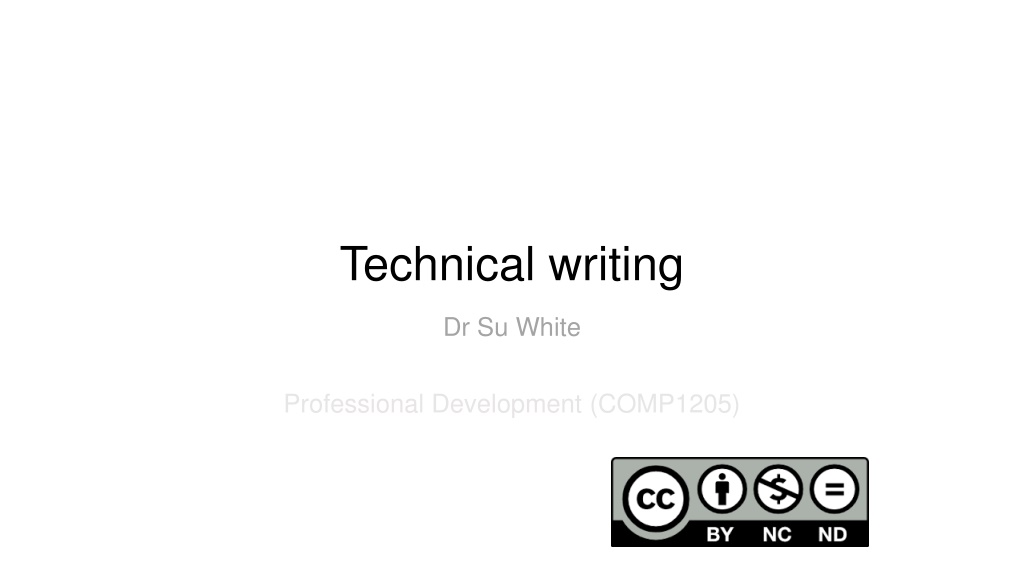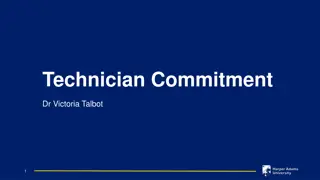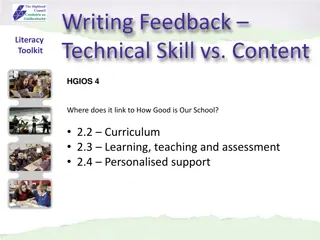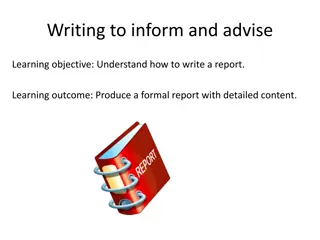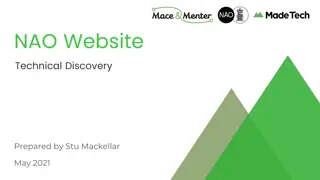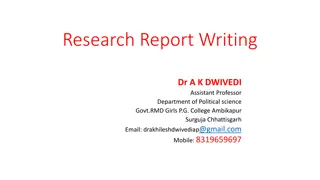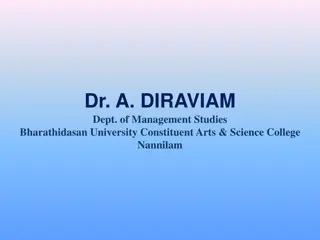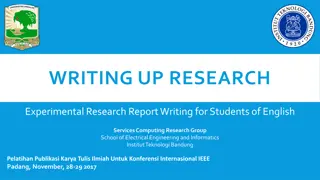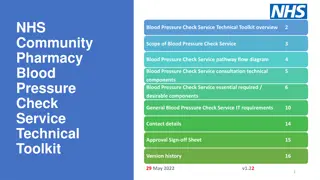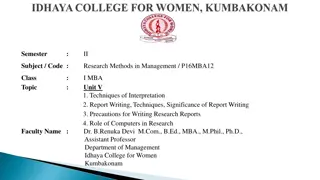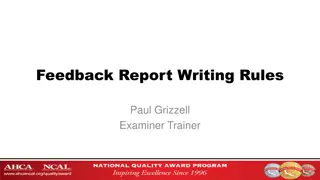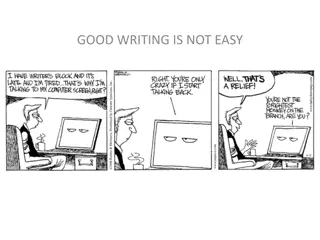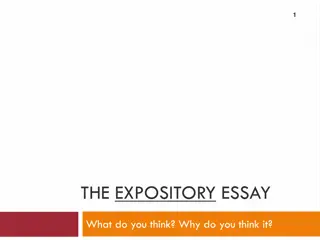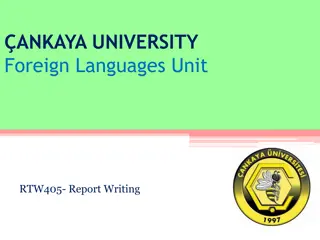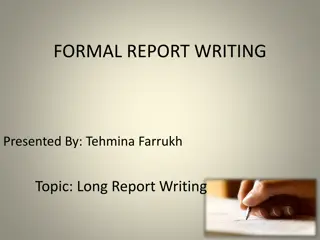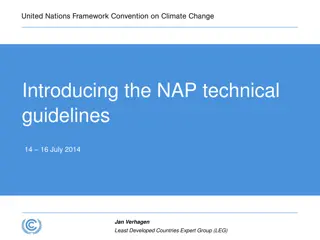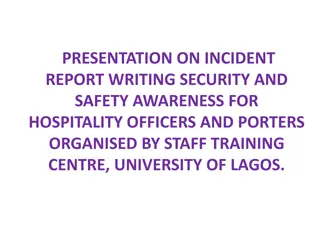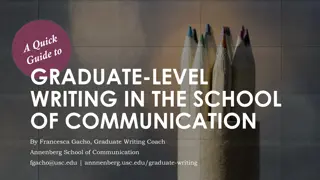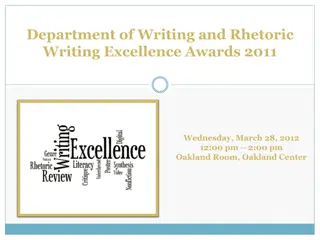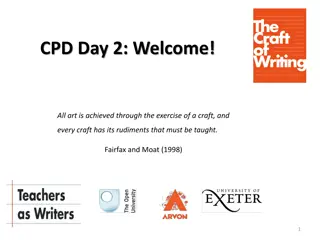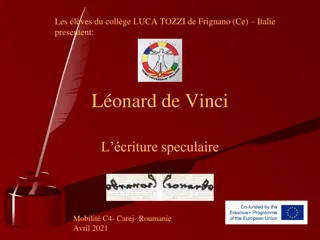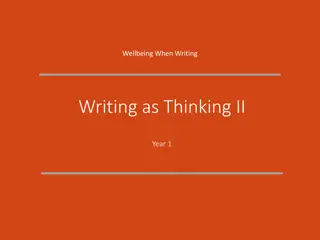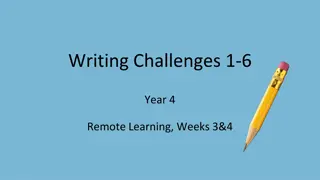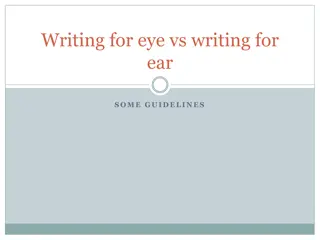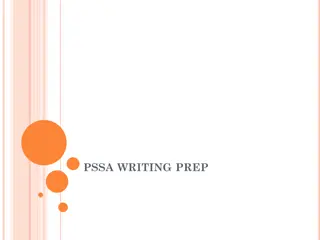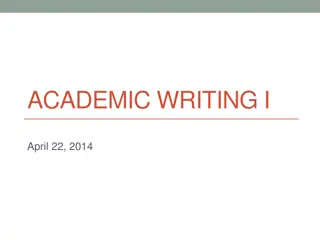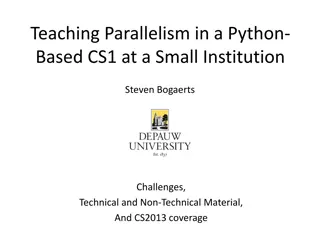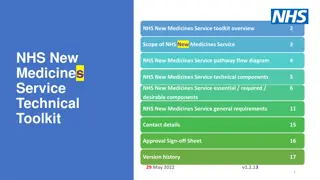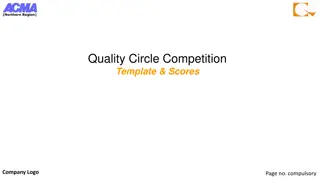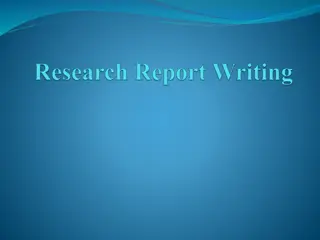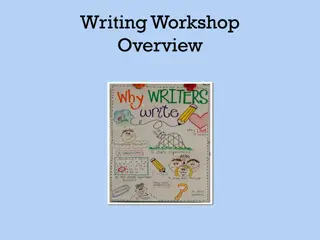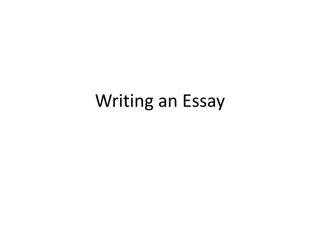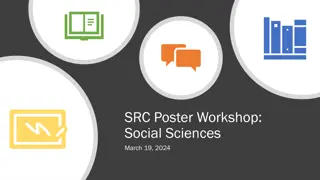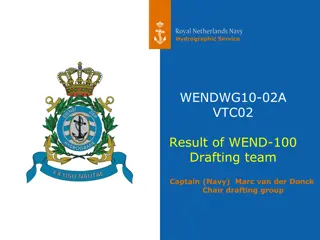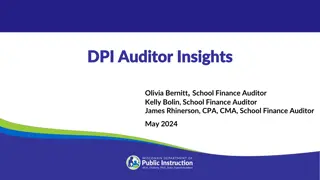Essential Guidelines for Technical Report Writing
Learn the fundamental principles of technical report writing, focusing on clear communication of research findings and insights. Understand your target audience, maintain objectivity, and follow conventions to ensure effective communication in technical reports. Explore who you are writing for, the importance of third-person perspective, and comparison of different authorial styles. Follow these essential guidelines to enhance your technical writing skills and effectively convey your findings.
Download Presentation

Please find below an Image/Link to download the presentation.
The content on the website is provided AS IS for your information and personal use only. It may not be sold, licensed, or shared on other websites without obtaining consent from the author. Download presentation by click this link. If you encounter any issues during the download, it is possible that the publisher has removed the file from their server.
E N D
Presentation Transcript
Technical writing Dr Su White Professional Development (COMP1205)
Technical report writing: fundamentals The purpose of the technical report is to communicate What you did Why you did it What you have found out 04/10/2024
Before getting started As a student you are asked to write technical reports about things that you know that the person who reads it (the marker) will already know Your marker is not your audience Your audience are people with an IT background, who need an introduction to the report topic Your task is still to give an account of that topic using recent and relevant sources You wish to communicate What you have found out . If you didn t find anything out: STOP NOW! Most technical reports are intended as communication of new knowledge I had this hypothesis and I tested it like this; here are my results and this is what we learn from them 04/10/2024
Who are you writing for Lab report You? Evidence of your actual results University coursework Should aim to explain what you have done to your kid sibling Write for a first year student of CS/IT Third year project PhD thesis Write for a CS/IT expert, but not necessarily in this domain Write for a CS/IT expert, but not necessarily in this domain Write for an intelligent person who knows nothing about the area (the intelligent reader ) Your readers, followers, etc. You should know who they are and what they expect (online branding) Published scientific paper Magazine article Blog 04/10/2024
Who is writing the report The convention is to write everything in the third person (objectively, not subjectively) No room for I think / I believe - technical reports should take an objective and scientific standpoint This does not apply to blogs and magazine articles which are often intentionally subjective Can lead to unpleasant use of passive voice. 04/10/2024
Who is writing the report Compare I/We did a survey of one hundred Web sites to ascertain One hundred Web sites were surveyed to ascertain The author surveyed one hundred Web sites to ascertain Some expert writers break the rules just as some expert artists break the rules. In both cases you need to make sure you know how to do the job properly before you try! 6 04/10/2024
The author reports Compare I/We did a survey of one hundred Web sites to ascertain The author surveyed one hundred Web sites to ascertain One hundred Web sites were surveyed to ascertain 7 04/10/2024
Be modest/objective Avoid self-congratulatory statements I have produced a comprehensivereport I studied the most important works vs I studied some of the most important works Don t oversell/brag Explain how you selected the related work let the reader decide whether you ve covered everything Let the reader decide, just report 8 04/10/2024
Style guidelines (2) Avoid long sentences Start with: subject predicate object. Avoid the use of different tenses in the same paragraph Every sentence should add more information to your story See what happens if you delete a sentence, will the meaning change? will the reader still be able to understand what you want to say? If yes, delete it. Every sentence is part of an argumentation It should be related or follow from the previous one Use of capital letters Proper nouns and in places where acronyms are being defined E.g. Remote Procedure Call (RPC) 9 04/10/2024
Technical report structure Title page Declaration Acknowledgement Contents Name, affiliation, date, contact details, etc. Who did this work People who have helped or influenced your work Sections, sub-sections and page numbers (probably not sub-sub-sections) Standalone summary of report Provides the motivation and context and outlines other related work Theory, experimental method, results, discussion Including appropriate future work Works that you have cited Sources of further information Anything which would interfere with the continuity of the main report (typically detail) Abstract Introduction Main body Conclusions References Bibliography Appendices 04/10/2024
Introduction and conclusion The introduction should Motivate why you have done the work Demonstrate your awareness of related literature Explain your objectives Most things you touch upon in the introduction will be discussed further in the main sections of the report Don t waste space listing the title of each section to come The conclusion should Make it clear what the take away message is Demonstrate analysis and synthesis that you have undertaken Explain any limitations in your work Detail future work to be undertaken No new facts unless they refer to future work They are a pair and must be standalone Not everyone wants to read the detail 04/10/2024
Pictures and tables Can be very useful Follow citation/referencing rules from academic integrity lectures if you reuse someone else s material acknowledge, paraphrase Each table and picture need to be mentioned in the text needs a caption Tables above the table Figures below the figures 12 12 04/10/2024
References and bibliography The reference section is a list of all sources you cite, no duplicates The bibliography is further reading which has not been cited The first is compulsory, the second optional They are disjoint 13 13 04/10/2024
Some links Hints on technical writing (John Ringwood) These are not recent (1999) But they are comprehensive and clear www.eeng.nuim.ie/jringwood/Teaching/repwrite.pdf Also useful are the library writing support services http://library.soton.ac.uk/sash/writing 14 04/10/2024
